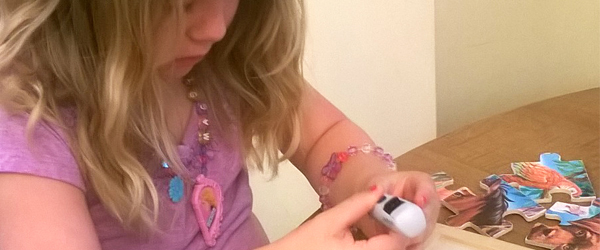M, checking her blood sugar.
November is Diabetes Awareness Month. At this time every year, I talk (more than usual!) about diabetes. I do this in honor of my four-year-old granddaughter, M, who lives with type 1 diabetes. Before M was diagnosed in 2014, I thought I understood what diabetes was. In my mind, it was a self-inflicted condition caused by junk food and lack of exercise. Basically, I believed it happened to fat, lazy people who drank too much soda. My notion was challenged to the core when M — a lively, fun, active, slim, healthy child — was suddenly in a life-threatening condition in the PICU at Albany Med with the diagnosis of type 1 diabetes. Once the initial shock had subsided, another myth was busted: Insulin was not a “cure.” It’s what M would need to be injected with several times a day to stay alive.
I’ve learned a lot about diabetes in the past few years. I know now that type 1 diabetes is an autoimmune condition that is NOT preventable and can happen to anyone at any age, regardless of lifestyle, diet or body type. I’ve learned that blood sugar levels are affected not only by diet, but also by exercise, stress, illness, hormones and growth spurts. I’ve witnessed the full-time efforts that go into monitoring, testing, carb counting and adjusting insulin rates (“diabetes math”), in the hope of preventing the long-term effects of high blood sugars, including stroke, kidney failure, blindness, heart disease and amputations. I’ve seen first-hand the effects of relentless caregiving on M’s family, as well as the huge financial burden. I’ve felt the frustrations and worry caused by blood sugar numbers that are super-high or low despite the most diligent efforts. I’ve also felt the sting of comments and advice from people who are uninformed (just as I was!).
I encourage you to watch this short movie documenting the life of a teen who lives with type 1 diabetes. I’ve found it to be a very accurate portrayal of the 24/7 diabetes rollercoaster.
November 14th marks the birthday of Frederick Banting, co-discoverer of insulin, for which he received a Nobel Prize in 1923. His work and discovery continue to enable all people with type 1 to stay alive. Thank you, Dr. Banting! An exciting new development in diabetes treatment is the artificial pancreas which received FDA approval in September 2016! You can read about it here.
OT snippet: Diabetes carries a stigma, due in part to associations with excess, bad choices and the idea that the person was in some way responsible. Decreasing stigma begins with education and awareness. An excellent place to gather easy-to-digest, research-based information is the website of the Juvenile Diabetes Research Foundation.
As health care practitioners, we will undoubtedly care for people with diabetes. Whether we are working with a newly-diagnosed type 1 teen whose life is suddenly forever altered, or an older person with long-term type 2 diabetes who needs help with their diet or is relearning how to walk on a prosthetic leg, we play a vital role in supporting and educating.
Also, let’s do our best as OTAs (or nurses) to stay mindful of what we DON’T know and of how much our clients/patients can teach us. How does their physical condition affect them/their family/their mental health? Let’s show compassion, be informed, advocate for our clients, not perpetuate stereotypes regarding medical conditions, and let us listen!
-Liz
